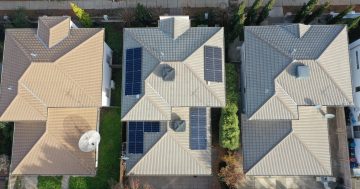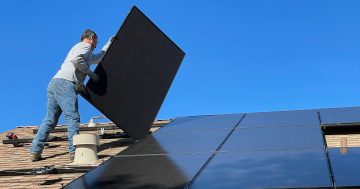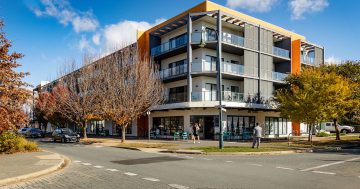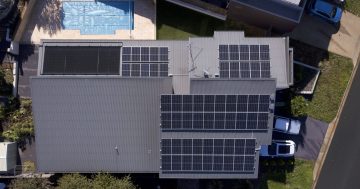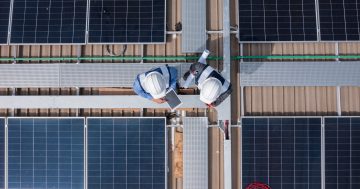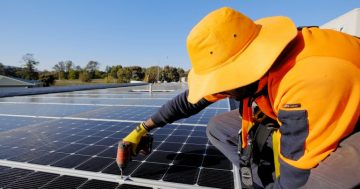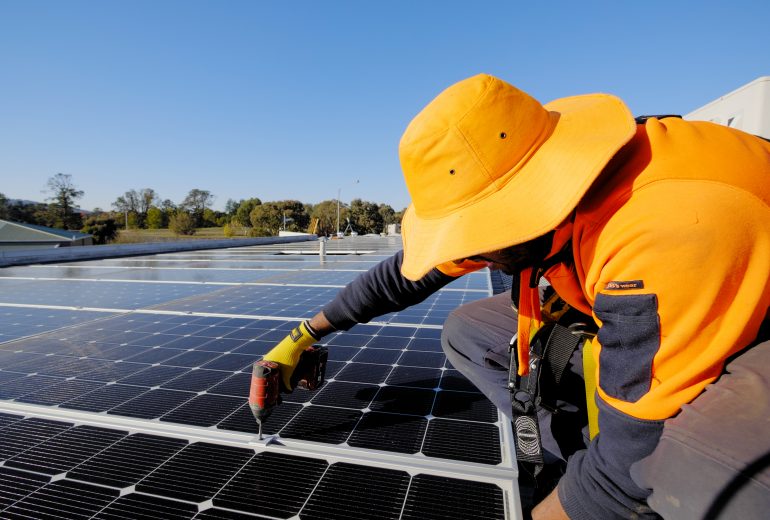
Customers are using the Sustainable Household Scheme to fit as much solar as they can on their roofs. Photo: SolarHub.
The ACT Government’s interest-free loan scheme to help householders boost the energy efficiency of homes has received more than 1500 applications worth $16.5 million since it began as a pilot in July.
By 15 November, 1552 householders have applied for a loan of up to $15,000 through the Sustainable Household Scheme for a range of products, with 394 installations having been completed.
About $1 million in loans are being settled every fortnight and 2.7 MW of rooftop solar has so far been installed under the scheme.
A government spokesperson said the majority of feedback received from customers about the scheme had been positive.
“They are genuinely excited about making sustainable improvements to their homes, doing their bit for the environment, cutting down on energy costs and future-proofing their homes,” the spokesperson said.
Most applications have been for solar systems only (794) followed by solar and battery bundles (335), battery only (153), heating and cooling systems (151), hot water heat pump (106), electric stovetops (12) and only one for an electric vehicle charger.
Householders can bundle any products up to the $15,000 loan limit.
The spokesperson said phase 2 of the scheme will include loans for electric vehicles and open before the end of the year.
Loan applications for EVs will be open to all eligible households and individuals at the same time.
“All the current known EV suppliers have been invited to participate and a range of new and used EV dealerships have already shown interest in the scheme,” the spokespersons said.
More information about this next stage will be available soon.
Canberra region solar energy system installer SolarHub said the phone had been running hot since the start of October with a doubling in the number of enquiries and sales.
CEO Ben Masters said the company was booked out until the end of January and demand had been mainly for solar and batteries, with many using the scheme to choose bigger systems.
He said the typical residential system was 6.6 kilowatts but people were buying up to 10kw with the average now 8 or 9kw.
“People are really maxing out that loan and maxing out what they can fit on their roof,” Mr Masters said.
He said the company had just taken on four new apprentice electricians and expected to create a further three internal teams to cope with the demand.
The scheme was creating new jobs and was a good news story coming out of lockdown and COVID, he said.
But SolarHub was not immune to the supply chain issues and price increases, especially for goods coming out of China, impacting all industries.
Mr Masters said its suppliers had warned the company and it was able to place bigger forward orders in August and September, but there had been delivery delays that had forced rescheduling of installations.
He said SolarHub had been forced to bump up prices in the past few weeks, in some cases 10 to 15 per cent, saying it had been able to absorb some of the cost but could not avoid passing on the rest to consumers.
The demand created by the scheme has attracted some Sydney and Melbourne companies into the market, but Mr Masters said there was a strong Canberra industry and people were keen to spend locally and support local businesses, particularly after COVID.
“There are a lot of good local companies that are priced right, that deliver good customer services and a high-quality install, so I think the local industry is able to counter that Sydney and Melbourne influx,” Mr Masters said.
The scheme is open to new applications for five years.












